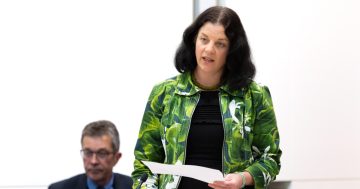
Greens candidate for Murrumbidgee Harini Rangarajan said her party will also look to impose minimum standards for occupancy agreements in residence halls. Photo: Facebook.
The ACT Greens have pledged to set new minimum standards for all homes being offered for rent, to make it compulsory for leased properties to have curtains or blinds and draught-proofing, and at least one fixed heater if they lead the government after the October 2024 election.
“We think this is pretty basic stuff that’s affordable for landlords and will make a big difference to tenants’ quality of life,” Greens leader Shane Rattenbury said.
“Especially as climate change keeps driving more extreme temperatures and impacts like the bushfire smoke we endured in 2019, Canberrans need homes that are a safe base from which to build a healthy and fulfilling life.”
In April 2023, the ACT Government introduced a minimum insulation standard for rental properties. Under this regulation, rental properties must have adequate ceiling insulation to keep houses warmer in winter and cooler in summer.
Mr Rattenbury said his party drove that reform and will make life even better for renters if they’re the leading party in the next government.
“Renters have been out in the cold for too long and the Greens understand it’s time to fix this problem,” he said.
“We’ve been able to make big improvements in renters rights this term, banning no-cause evictions and enabling more renters to keep pets, but there’s still a lot more to do.”
ACT Real Estate Institute chief executive Maria Edwards says the Greens are painting a dark picture of landlords.
“The Real Estate Institute of the ACT (REIACT) acknowledges the ACT Greens’ commitment and shares their vision of providing healthy, safe, and comfortable homes for all Canberrans. We welcome the opportunity for ongoing dialogue on these important issues to ensure that we achieve a balanced outcome and REIACT encourages a collaborative approach between government, tenants, and property owners,” she said.
“It should be noted that despite what the Greens would have you believe, all landlords in the ACT are not heartless, and tenants are not powerless. Rental properties are generally priced according to the features available. Heating, cooling and energy efficiency are often at the top of the list as considerations. There would be very few landlords in Canberra that would not supply some sort of heating – it doesn’t make sense as their property would just not rent in a city with our climate.
“There is nothing currently stopping a tenant from requesting upgrades such as curtains or draught proofing if they are finding a property uncomfortable, and property managers facilitate these requests often, as with any other upgrades or maintenance.”

ACT Real Estate Institute chief executive Maria Edwards rejects claims her industry is fear-mongering. Photo: File.
Ms Edwards questioned the wisdom of making rental property upgrades compulsory.
“What is dangerous … is mandating expensive upgrades in a cost-of-living crisis and an environment where housing supply is a critical issue. It would be wonderful if all homes in the ACT had an 8-star energy rating; however, it can’t be ignored that this comes at a cost.”
Mr Rattenbury accused the property industry of “fear-mongering” against rental reforms, a claim Ms Edwards rejected.
“Ask any agent at the moment in Canberra whether investors are currently selling off, and you will get a resounding, ‘Yes’ … Private investors are vital to not only the supply and choice of housing options for renters in the short term but also long term as well.”
Greens candidate for Murrumbidgee Harini Rangarajan said her party would also look to impose minimum standards for occupancy agreements in residence halls, which are often used by universities providing accommodation for students.
“Occupancy agreements provide fewer protections than leases do, and that’s an issue that’s been raised with us by students,” she said.
“The Greens’ plan to limit occupancy fees, apply minimum standards, and ensure timeframes for repairs and maintenance are met, will improve the everyday lives of renters on occupancy agreements in Canberra.”
The ACT Greens have also promised to upgrade public housing, saying a government they lead would install solar panels on all suitable public homes by 2030, ensure all new public homes have solar panels from 2025, and upgrade all public homes to be efficient and all-electric by 2030.



















